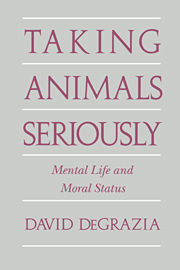Book contents
- Frontmatter
- Contents
- Acknowledgments
- 1 A short primer on animal ethics
- 2 The coherence model of ethical justification
- 3 Animals' moral status and the issue of equal consideration
- 4 Motivation and methods for studying animal minds
- 5 Feelings
- 6 Desires and beliefs
- 7 Self-awareness,language,moral agency,and autonomy
- 8 The basics of well-being across species
- 9 Back to animal ethics
- Index
7 - Self-awareness,language,moral agency,and autonomy
Published online by Cambridge University Press: 05 June 2012
- Frontmatter
- Contents
- Acknowledgments
- 1 A short primer on animal ethics
- 2 The coherence model of ethical justification
- 3 Animals' moral status and the issue of equal consideration
- 4 Motivation and methods for studying animal minds
- 5 Feelings
- 6 Desires and beliefs
- 7 Self-awareness,language,moral agency,and autonomy
- 8 The basics of well-being across species
- 9 Back to animal ethics
- Index
Summary
In Chapters 5 and 6, we found that animal feelings, desires, and beliefs were interconnected in nature. Animals possessing one of them (say, feelings) possessed the others (desires and beliefs) as well, even if the terms designating them sound unequally cognitive. Feelings, desires, and beliefs have something else in common: Many persons would attribute all of them to “higher” animals, such as mammals, with little hesitation.
In this chapter, we examine some mental phenomena and capacities that seem to be of a different order. These phenomena and capacities may be grouped into the categories of self-awareness (self-consciousness), language, moral agency, and autonomy. If any of these is entailed by mental phenomena studied in Chapters 5 and 6, this fact is not obvious and would have to be argued carefully. Nor are we, pre-reflectively, as likely to attribute such phenomena and capacities to animals. But no thorough exploration of animals' mental life—much less a well worked-out animal ethics—can avoid confronting some of the issues that we tackle in this chapter.
THE WORLD AND SELF OVER SPACE AND TIME — SELF-AWARENESS
Distinguishing one's own body from the rest of the environment
Are any nonhuman animals self-aware? We will approach this question gradually, by considering various capacities each of which may suggest a degree of self-awareness. The first and perhaps most basic capacity of this sort is the ability to distinguish one's own body from the rest of the environment.
- Type
- Chapter
- Information
- Taking Animals SeriouslyMental Life and Moral Status, pp. 166 - 210Publisher: Cambridge University PressPrint publication year: 1996



